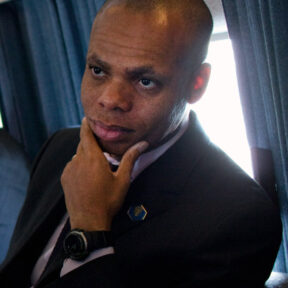
Patrick Gaspard
Photo from Wikimedia Commons / Author of Photo: The White HouseOverview
* Former community organizer
* Worked for Jesse Jackson’s presidential campaign in 1988
* Was an organizer for the New Party, a socialist political coalition, in the 1990s
* Served as executive vice president of the Service Employees International Union’s Local 1199
* Was a leading activist with the Working Families Party, an outgrowth of the New Party
* Served as political director for Bertha Lewis, who was the head of ACORN’s New York chapter
* Served as the director of President Barack Obama’s Office of Political Affairs from January 2009 to January 2011
* Became executive director of the Democratic National Committee in January 2001
* Was appointed U.S. Ambassador to South Africa in 2013
Patrick Gaspard was born in Kinshasa, Zaire, after his father had fled there from the Duvalier dictatorship in Haiti. When Patrick was three, he immigrated with his parents to the United States and was raised in Park Slope, Brooklyn.
As he grew into young adulthood, Gaspard came to admire Third World leftists and revolutionaries. He had a particular fondness for Aime Cesaire, a radical poet/politician from the French colony of Martinique. A member of the French Communist Party, Cesaire was a teacher to the Marxist theorist Frantz Fanon.
Gaspard entered the world of politics in the mid-1980s, when he became a community organizer who planned and coordinated New York City-based demonstrations for “social justice” in Haiti as well as a variety of school-reform issues. In 1988 he worked for Jesse Jackson’s presidential campaign, and the following year he served as a volunteer (along with Bill de Blasio) on Democrat David Dinkins’ successful NYC mayoral campaign. Gaspard and de Blasio would go on to become close friends.
In late 1995 Gaspard was working in New Jersey as an organizer for the New Party, a socialist political coalition that then-Illinois state senate candidate Barack Obama had recently joined.
In 1997, outgoing Manhattan borough president Ruth Messinger, who was a member of the Democratic Socialists of America (DSA), enlisted Gaspard to work for her (ultimately unsuccessful) mayoral campaign against Rudolph Giuliani.
After the Messinger campaign folded, Gaspard took a job as chief of staff to New York City councilwoman and radical feminist Margarita Lopez.
In 1999, while Gaspard was still employed by Lopez, New York City was rocked by the controversial shooting (by four police officers) of a 23-year-old, black, unarmed illegal immigrant from Guinea named Amadou Diallo. The officers mistook Diallo for an armed man who resembled the description of a serial rapist they were seeking. In the wake of the incident, two officials (political director Bill Lynch and president Dennis Rivera) from one of the city’s most powerful and militant labor unions, the Service Employees International Union‘s (SEIU’s) Local 1199, recruited Gaspard to organize and lead the union’s “March for Justice” against alleged police brutality; Gaspard also led a series of additional demonstrations thereafter. Before long, he rose to become the union’s executive vice president.
By 2001, Gaspard was a leading activist with the New York Working Families Party (WFP), an outgrowth of the New Party.
In 2001 Gaspard served as political director for Bertha Lewis, who was, at that time, the head of ACORN‘s New York chapter. (Lewis would go on to become ACORN’s chief national organizer seven years later.) In the July 2, 2001 issue of The Nation, Gaspard and Lewis jointly published a letter defending the Working Families Party against its critics. In that letter, the authors described their extensive joint involvement in WFP activities; they signed their names as: “Bertha Lewis, ACORN, WFP”; and “Patrick Gaspard, SEIU State Council, WFP.” (As of 2009, Gaspard is was listed as an advisory board member of the WFP-aligned Working Families Center.)
In 2003 Gaspard served as acting field director for Democrat Howard Dean‘s presidential bid. After the Dean campaign fizzled in 2004, Gaspard became the national field director for America Coming Together. Later, he helped city councilwoman Yvette Clarke win the congressional seat vacated by DSA member Major Owens. (Clarke went on to become a member of the Progressive Caucus, which has deep, longstanding ties to the DSA.)
In 2006 Gaspard was the acting political director (i.e., a federally registered political lobbyist) for SEIU International (which was closely tied to ACORN) during the union’s successful effort to help Democrats recapture majorities in both the House of Representaives and the Senate. He focused heavily on the issue of healthcare during his tenure with SEIU. For instace, he lobbied for an extension of the State Children’s Health Insurance Program and helped congressional Democrats pass the bill before President George W. Bush vetoed it.
During the 2008 Democratic presidential primary, Gaspard was Barack Obama‘s national political director, using his labor ties to galvanize massive get-out-the-vote efforts in states with large union populations like Pennsylvania, Texas, and Ohio.
After Obama’s electoral victory in November 2008, Gaspard served as an advisory board member of the new president’s transition team. His fellow advisory board members included such notables as Carol Browner, Janet Napolitano, and Susan Rice.
In November 2008 Obama announced that Gaspard would serve as director of the Office of Political Affairs, where he was entrusted with: (a) providing the President with an “accurate assessment of the political dynamics affecting the work of his administration,” and (b) “work[ing] with powerbrokers around the country to help push the President’s agenda.”
In January 2011, Gaspard left the White House and became executive director of the Democratic National Committee, a post he held until 2013.
After the Supreme Court ruled, in June 2012, that the “Obamacare” health-care reform legislation (passed in 2010) was constitutional, Gaspard wrote on his Twitter account: “It’s constitutional. Bitches.”
In early 2013, President Obama selected Gaspard to be the next U.S. Ambassador to South Africa. Gaspard was officially sworn in to that post on August 13th of that year.